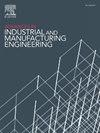Influence of dressing parameters on the formation of micro lead on shaft sealing counterfaces during external cylindrical plunge grinding
Abstract
The function of radial sealing systems depends significantly on the shaft counterface. External cylindrical plunge grinding is considered the standard for the manufacturing of suitable shaft counterfaces. It creates a stochastic surface texture with many anisotropic groove-like grinding structures, oriented in the circumferential direction of the shaft. The structures are created by the grain engagement into the workpiece during the grinding process. This surface characteristic exhibits optimal properties for hydrodynamic lubrication between the seal and the shaft. Although there is no axial relative movement between grinding wheel and workpiece in plunge grinding, under unfavorable conditions grinding structures can be produced that deviate from the circumferential direction. These structures then transport fluid through the sealing during rotation. Structures, that cause fluid transportation because of inclined orientation to the circumferential direction, are referred to as micro lead. Especially for high rotational speeds, e.g. in electric powertrains, micro lead causes high pumping effects and therefore leakage and following failure of products. This publication presents findings on the influence of the dressing parameters on the formation of micro lead during external cylindrical plunge grinding. The experimental investigations show that especially negative dressing speed ratios lead to the formation of micro lead structures.

 求助内容:
求助内容: 应助结果提醒方式:
应助结果提醒方式:


